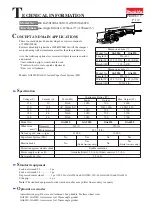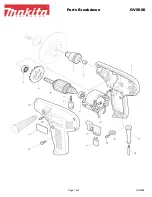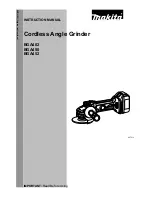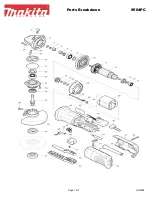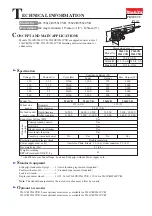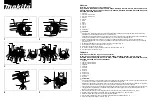
18
▪
Implement additional safety measures to protect the operator from the effects
of vibration, such as servicing the power tool and application tools, keeping their
hands warm, and organising workflows correctly.
▪
Always use undamaged flanges of the correct size and shape for your cutting
disc. The correct flanges support the disc and reduce the risk of a disc fracture.
Flanges for cutting discs can differ from those for grinding discs.
▪
Do not use worn-down discs from larger electric tools, these are not intended
for the fast speeds of smaller electric tools and may fracture.
▪
Avoid blocking the disc and do not use excessive pressure. Do not attempt
excessively deep cuts. Excessive loads on the cutting disc increase the stress and
make it more prone to jamming or blocking and increase the risk of kickback of
fracture.
▪
Avoid the area directly in front or behind the spinning discs. If the cutting part of
the disc is moving away from you, the electric tool with the spinning disc can be
thrown back at you in case of a kickback.
▪
If the disc becomes stuck or locked in the work piece or you intend to interrupt
your work, turn off the electric tool and hold it tightly until the disc has come to
a complete standstill. Never attempt to lift the spinning disc out of the cut, this
may cause kickback. Verify and remove the cause for the stoppage.
▪
Do not turn on the electric tool while the disc is in the work piece. Allow the disc
to reach full speed before carefully resuming the cut. Otherwise the disc may
jam, jump out of the cut or kick back.
▪
Support sheets or large work pieces to reduce the risk of a kickback caused by
the disc being wedged in the work piece. Larger work pieces may deform under
their own weight. The work piece must be supported on both sides, on the edges
as well as close to the cut.
▪
Be especially careful when undertaking "pocket cuts" in existing walls or other
areas which cannot be overlooked. When plunging into the wall the disc can kick
back when hitting gas or water pipes, wires or other objects in the wall.
▪
Before cleaning or maintaining, first disconnect the plug from power mains.
▪
Do not continue using the electric tool if it was damaged or the tool was
dropped or immersed in water. Please contact our customer support service.
Additional Battery and Charger Safety Notes
WARNING: Li-Ion batteries, if incorrectly used, stored or charged are a fire, burn and
explosion hazard.
Use the battery charger correctly
▪
Refer to the section of this manual relating to use of the battery charger before
attempting to charge the battery.
Summary of Contents for 96 78 99
Page 6: ...6 1 2 3 4 4 4...
Page 38: ...38 NOTIZEN NOTES...































